What would happen if you stopped eating food but continued to drink water?

What would happen if you stopped eating food but continued to drink water? After a few days without food, your body would begin to break down its fat and muscle stores for energy. This process, known as ketosis, causes you to lose weight quickly.
Without a consistent supply of nutrients, your body would also experience severe side effects.
After a week or two without food, you would become extremely weak and exhausted. In addition, your hair and nails would become brittle, and your skin would become dry and wrinkled.
You would also be at risk for dehydration, electrolyte imbalances, and severe organ damage. In short, starving yourself is not a sustainable or healthy way to lose weight.
If you're looking to slim down, focusing on healthy choices about the foods you eat is much better.
What happens to your body if you only drink water and don't eat food?
Imagine if you only drank water and never ate food. What would happen to your body? For the first few days, you would probably feel fine.
You might even lose a few pounds as your body releases stored glycogen. But after that, things would start to get ugly.
Your muscles would waste away, and you would become weak. Also, your heart would start to fail, and you would be at risk of organ failure.
Besides, you would become lethargic, unable to think clearly or concentrate on anything.
In short, your body would slowly start to shut down. Without food, we could not survive for long.
So if you want to improve your health, include plenty of healthy foods in your diet. Your body will thank you for it!
4 Benefits of fasting with water
Fasting with water has some benefits.
- First, it helps to cleanse the body of toxins and impurities. The digestive system can rest and heal by abstaining from food, improving overall health.
- Fasting also helps to improve mental clarity and focus. When we fast, our bodies can redirect energy away from the digesting food and towards other functions, such as repair and cell regeneration.
- In addition, fasting can help to boost weight loss by increasing metabolism and burning fat.
- Finally, fasting is a great way to give the body a break from processed foods and artificial ingredients.
By consuming only water, we allow our bodies to reset and recharge, which can lead to improved health in the long term.
How to fast with water safely
Fasting is a practice that has been used for centuries to promote physical and spiritual health. While there are many different ways to fast, one of the simplest and most effective is to fast with water.
When you fast with water, you give your body a chance to rest and heal by consuming nothing but water for a while.
While water fasting is safe for most people, there are a few things to keep in mind to stay safe and healthy.
- First, it's essential to drink plenty of water when you're fasting. That will help to prevent dehydration and keep your body functioning correctly.
- Second, avoiding strenuous activity while you're fasting is a good idea. That includes things like exercise and working out. Instead, focus on relaxing and giving your body a chance to rest.
- Finally, make sure to listen to your body and stop fasting if you start to feel sick or weak.
Water fasting is a great way to promote health and wellness, but it's essential to do it safely. Follow these tips, and you'll be sure to have a successful fast.
The best time of day to drink water for fasting
When it comes to fasting, there is no one-size-fits-all approach. For example, some people prefer to fast for a shorter period each day, while others choose to fast for 24 hours or more.
However, if you're planning on drinking water during your fast, there are a few things to remember.
- First, drinking plenty of water before starting your fast is essential. That will help prevent dehydration and give your body the necessary resources to break down stored fat for energy.
- Second, you should drink water slowly throughout the day. Sipping on water regularly will help stave off hunger and keep your body hydrated.
- Finally, drink plenty of water after you break your fast. That will help rehydrate your body and replenish the fluids you lost during fasting.
What to do if you feel hungry while fasting?
Fasting is a great way to cleanse your body and give your digestive system a break. However, if you're not used to fasting, it's normal to feel hungry at first. Here are a few tips to help you get through the fast:
- Drink plenty of water. That will help to fill your stomach and keep you hydrated.
- Focus on positive thoughts. Think about all the benefits of fasting, such as cleansing your body and detoxifying your system.
- Eat small meals when you break your fast. Don't overeat, or you'll make yourself feel sick.
With time and patience, you'll get used to fasting, and the hunger will go away. Soon, you'll be reaping all the benefits of this healthy practice!
Final words
What would happen if you stopped eating food but continued to drink water? If you are starving, make sure to drink lots of water! And for more information on healthy eating habits and how to lose weight correctly, read our other articles. Thanks for reading!
DISCLAIMER: buildyourbody.org does not provide medical advice, examination, or diagnosis.
Medically reviewed and approved by Nataniel Josue M D.
